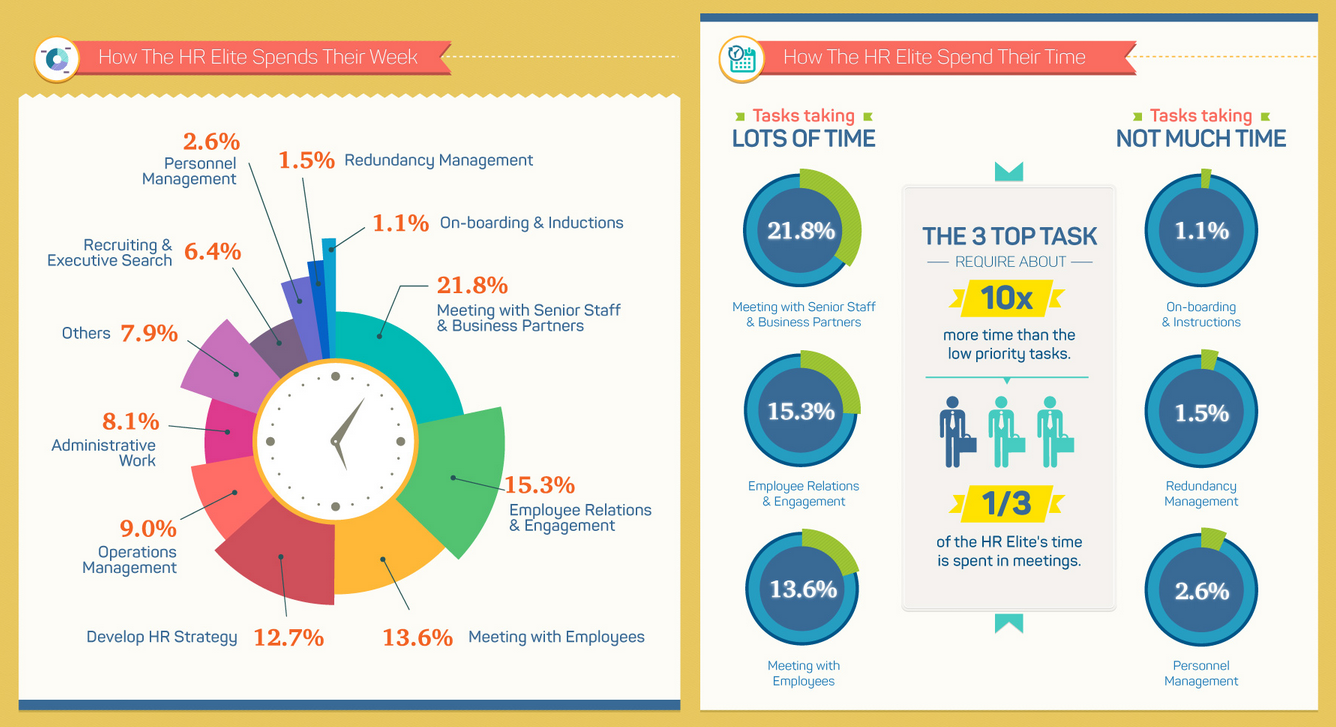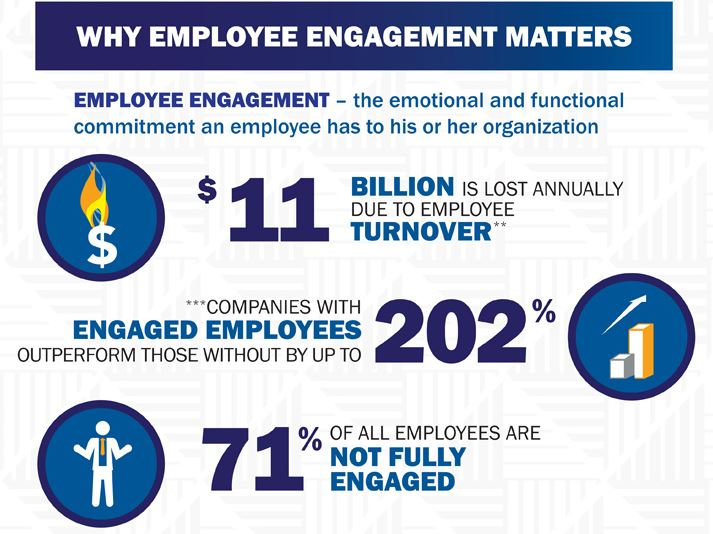The idea that human resources (HR) teams are just generic company administrators, constantly buried in paperwork and spreadsheets, is false in today's workplace. In addition to the administrative tasks they perform, modern HR professionals are under great demand for exceptional cultural awareness and business innovation. From understanding how digital technology is changing the workplace to finding the right tools and metrics to measure employee success, they're constantly adapting to the needs of an ambitious and increasingly mobile pool of talent.
An internal HR department touches virtually every aspect of a business, and they are key decision-makers when it comes to managing human capital. We're breaking down what exactly an HR team does (or should do) and why they are important.
Editor's note: Looking for the right HR software for your business? Fill out the below questionnaire to have our vendor partners contact you about your needs.
 Image via Totaljobs Infographic
Image via Totaljobs Infographic
Why are HR professionals important for businesses?
It's important to invest money and enthusiasm into human resources because every person in your business stands to benefit from the connectivity and information an effective HR team can provide. Here are some of the top benefits your HR professionals can provide for your business.
Recruitment and onboarding
HR professionals can recruit top talent that aligns with your organization. Finding the right candidate for each position is crucial, as a bad hire can cost you roughly 30% of that employee's first-year earnings – and that estimate is on the low end. Successful recruiting involves careful planning, analysis and communication. HR professionals know which questions to ask in an interview to find the best candidates – those who match not only your organization's needs, but also your company culture.
Once an HR professional finds and recruits a qualified candidate, they are often responsible for onboarding and training them. According to the Work Institute, nearly 40% of new employees quit within the first year; of those who quit, 43% leave within the first 90 days. If this is a problem in your company, your HR professional can modify the onboarding and training process to better meet employee needs and expectations, thus reducing turnover rate.
Talent management
HR professionals manage your talent from start to finish. They are responsible for processes that can help you retain personnel, like administering comprehensive employee benefits and offering competitive employee compensation. They also take care of administrative HR functions, like tracking employee hours, managing time off requests, processing and administering payroll, running and analyzing HR reports, and maintaining proper employee records.
A good HR department will also focus on talent management principles like employee performance and development. If an employee is struggling to perform well, HR can provide them with the additional support or resources they may need, and they can create a performance improvement plan if necessary. If disciplinary action needs to be taken against an employee, HR will usually handle this too.
As an employee grows within your organization, HR can help set them up with career guidance and professional development opportunities. Additional training and learning play an essential role in increasing employee retention and reducing employee attrition.
Company culture
HR professionals foster and maintain your company culture. They start by hiring employees who match your culture, and then they sometimes host a series of team-building activities and events that promote that culture from within. They can also focus on diversity and inclusion efforts that help create a welcoming and safe environment for your staff. Organizations that don't have an HR manager to facilitate company culture run the risk of losing their company culture altogether, especially as they grow.
HR departments have also become an intrinsic part in aiding employees by engaging with their concerns, appealing to their interests and resolving their needs. They support the improvement of the work environment and resolve individual issues as they arise. Without a dedicated point person to voice their concerns to, employees are at a higher risk of leaving the company.
Employee-executive relations
HR professionals are the middleman that can effectively communicate between a company's employees and executives. They can speak with employees to learn what their concerns or ideas for change are, and then they can voice the needs of the wider organization directly to the executives who need to hear them.
Regularly bringing together team leaders from across the organization with HR leaders can collate feedback that sets an agenda for the business's directors to address. Having an HR professional start these important conversations and demonstrate the value of effective employee-management dialogue is just another way HR can benefit your organization.

Risk and legal compliance
HR professionals can help you avoid risk and maintain legal compliance, which is arguably one of their most important functions. Running a business with employees comes with a litany of HR compliance challenges you must navigate, especially for those who operate in multiple states or countries. Varying laws and regulations can be difficult for employers to keep up with unless they have an experienced HR professional to help. By navigating these functions, an HR department can help you avoid potential noncompliance penalties and fees.
HR staff use reporting and analysis to determine company risks and suggest courses of action to mitigate or avoid those risks. They maintain all legally required employee records, conduct necessary training and so much more. If an employee needs to be terminated for whatever reason, they are responsible for that process as well.

Image via Dale Carnegie
What is an HR department?
Now that you know why HR is important for your business, make sure you fully understand what an HR department actually is. A human resources department is the team in your organization responsible for managing all things related to the employee life cycle, from recruitment to termination. Smaller teams may be fine with hiring one HR team member to manage the company's human resources, but the need for more help quickly increases as your business grows. Medium and large businesses often need an entire HR department.
The organizational structure of your HR team will depend on your specific business needs. For example, one company may want an HR manager to take care of general personnel tasks and a recruiter to focus on hiring talent, whereas another organization may need multiple HR managers, HR administrative assistants, training managers and recruiters.

What are the best HR software options available?
Regardless of whether you have one HR person or an entire HR department managing your company's human resources functions, you will likely need some form of HR software to streamline your processes. HR software has become so popular that the global demand is expected to exceed $10 billion this year, according to Grand View Research.
If you're looking for effective HR software to help manage your human resources needs, check out some of our top choices below.
- BambooHR: Those interested in managing employee performance should consider BambooHR. This HR software comes in two separate plans and has a variety of performance management add-on features. Check out our BambooHR review to learn more.
- GoCo: Employers looking to streamline their HR processes with custom workflows should consider GoCo. This HR platform automates a variety of HR functions. Read our review of GoCo to learn more.
- Gusto: If running payroll and managing payroll taxes are top priorities for you, Gusto is a great choice. The cloud-hosted HR platform offers a variety of plans. Check out our review of Gusto to learn more.
- Paychex Flex: Paychex offers both professional employer organization (PEO) and HR outsourcing options for employers, and is great for those who want a flexible option for remote teams. Its dashboard and mobile app are also easy to use. Check out our Paychex Flex review to learn more.
- Rippling: Rippling is among the easiest HR software options to implement. It's a flexible solution with both HR platform and PEO options, and it integrates with more than 400 applications. Read our Rippling review to learn more.
To help you find the right HR software for your organization, determine what your budget is, which features you need, how many employees you have (or will soon have), and which software you want it to integrate with.
Ian Burke contributed to the writing and research in this article.
